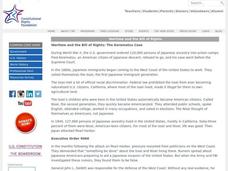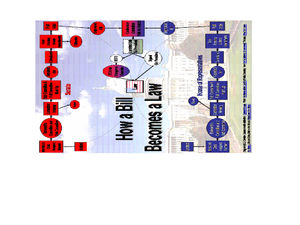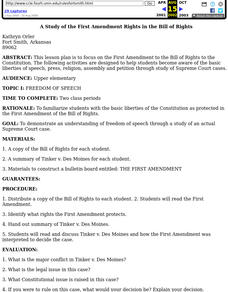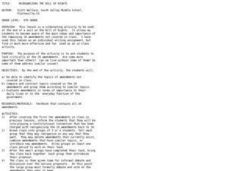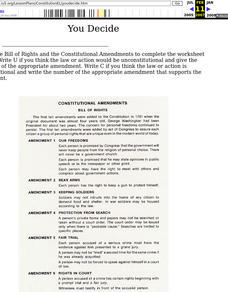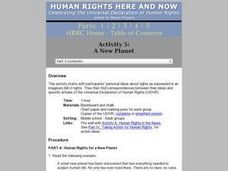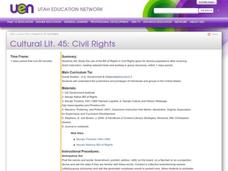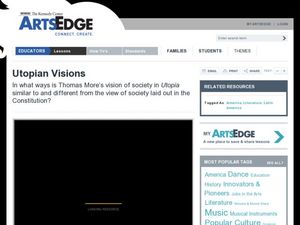Center for History Education
Continuity or Change? African Americans in World War II
While World War II was a pivotal moment in history, historians debate its importance to the civil rights movement. Class members consider the implications of segregation and the war using a series of documents and a jigsaw activity....
Administrative Office of the US Courts
Hazelwood v. Kuhlmeier
Freedom of speech is not always free. Scholars investigate how the First Amendment provides for the right to express opinions. Through the court case Hazelwood v. Kuhlmeier, they analyze free speech using primary documents—and hopefully...
Franklin D. Roosevelt Presidential Library & Museum
Developing Your Voice and Your Right to Free Speech
Three activities focus on the First Amendment, especially the freedom of speech. Scholars craft a letter to the President of the United States and express their views about a topic important to them. Another activity has participants...
Curated OER
Race and Voting in the Segregated South
Students examine the history of African American voting rights. In this voting rights lesson, students listen to a lecture on African American voting rights between the years 1890 and 1965. Students respond to discussion questions...
Carolina K-12
Preventing Voter Fraud or Encouraging Voter Suppression?
The issues of voter fraud and voter suppression are relevant in every election, local as well as national. Soon-to-be voters learn about a recent bill proposed in North Carolina, the Voter Information and Verification Act, and...
Curated OER
Tiananmen Square
Learners identify and explain the Tiananmen Square incident of June 1989.
Studentsl compare what it is to be an American Citizen (Democracy) vs.
Chinese Citizen (Communism). Learners identify and define various vocabulary terms,...
National Constitution Center
Interactive Constitution
Did you know there are seven Articles and 27 Amendments to the US Constitution? Explore each and every one of them, including the Bill of Rights and other rights around the world, in a super neat US Constitution interactive.
Curated OER
Wartime and the Bill of Rights: The Korematsu Case
Learners examine the balance between civil liberties and protection. In this national security lesson, students explore the Korematsu case which references the Japanese internment camps of World War II. Learners draw comparisons between...
Curated OER
How Government Works and the Rights of the People
Eighth graders identify how to be responsible citizens. In this civics lesson, 8th graders review websites of congressional members and then create questionnaires about the responsibilities of citizens.
Curated OER
A Study of the First Amendment Rights in the Bill of Rights
Students become aware of the basic liberties of speech, press, religion, assembly and petition through study of Supreme Court cases. Student groups analyae some cases heard by the Supreme Court to further their understanding of the First...
Curated OER
Reorganizing the Bill of Rights
Eighth graders look critically at the 26 amendments to the United States Constitution.
Curated OER
Wartime and the Bill of Rights: The Korematsu Case
Twelfth graders work together in groups to examine the discrimation Japanese Americans felt after the bombing of Pearl Harbor. Using primary source documents, they analyze and discuss the case of Fred Korematsu who was placed in an...
Curated OER
You Decide
What a cool worksheet! The full set of our Constitutional Amendments are included in this resource which helps learners know how to answer 10 questions intended to build an understanding of constitutional and unconstitutional actions.
Curated OER
Civil Rights: An Investigation
High schoolers take a closer look at the political side of the American Civil Rights Movement. In this 20th century American history lesson, students research the contributions of President Johnson, Dr. Martin Luther King, Jr., and J....
California Department of Education
Learning the Skills to Pay the Bills
Is CTE the right choice for me? Introduce the class to career and technical education through an exploratory lesson, fourth in a series of six career readiness activities. After an introductory video, scholars determine possible careers...
Administrative Office of the US Courts
Snyder v. Phelps
Does the Westboro Baptist Church have the protection of the Constitution when protesting military funerals? High schoolers examine the 2011 Supreme Court case of Snyder v. Phelps before comparing the situation to a fictional...
Curated OER
A New Planet
Students, in gorups, develop a Bill of rRghts for a newly discovered planet. They give the planet a name and they decide upon ten human rights they think are the most important. Then they compare their list with the lists of other...
Curated OER
Constitutional Resources
Students explore the REpublican Era and the writing of the constitution and Billof Rights through various links and activities included in this collection.
Curated OER
Civil Rights
Students are introduced to the concept of Civil Rights. In groups, they use a timeline of the Navajo tribe to identify the ways the tribe has made advances in Civil Rights throughout the years. To end the lesson, they take notes and...
Curated OER
Bill O'Rights
Students discuss and identify the first ten amendments to the Constitution and apply their understanding of the material to how they currently affect their lives. They discover the rights and responsibilities of being a citizen, and...
Curated OER
The Constitution of the United States
Students explore the Web site provided to answer questions about The Constitution of the United States. They write the missing word of words in the blanks. Students use this Scavenger Hunt to help familiarize themselves with the...
Curated OER
Are We Free Yet?
Students read excerpts from several Freedom Documents, evaluate amount of freedom guaranteed by each document, and rank documents on scale to determine which grant greatest and least amount of personal freedom.
Curated OER
A More Perfect Union
Fourth graders complete a unit of lessons on the development of the U.S. government. They examine the main ideas of the Declaration of Independence, develop a class translation of the preamble to the Constitution, create a flow chart,...
Curated OER
Utopian Visions
Students examine Sir Thomas More's Utopian vision. For this philosophy lesson, students read Utopia and determine the pros and cons of Utopian societies. Students then create and present monologues of residents of the Utopia.
Other popular searches
- English Bill of Rights
- The Bill of Rights
- Classroom Bill of Rights
- Constitution Bill of Rights
- Bill of Rights Play
- Bill of Rights Lesson
- Bill of Rights Day
- U.s. Bill of Rights
- Bill of Rights Newsletter
- Bill of Rights Debate
- British Bill of Rights
- American Bill of Rights







